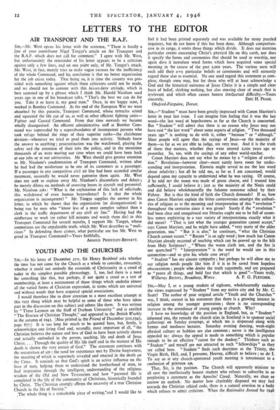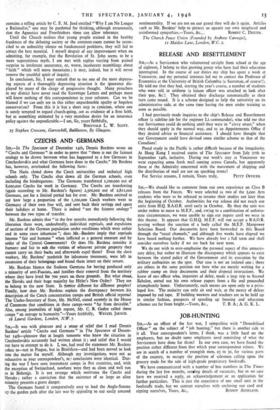SIR,—May I, as a young student of eighteen, wholeheartedly endorse
the views expressed by " Student " from my native city and by Mr. C. Scott? The author of your original article " Youth and the Churches " was, I think, correct in his statement that there is a growing interest in religion among the younger generation ; there is no corresponding increase in the attendance of young people at church. Why?
I have no knowledge of the position in England, but, as " Student " informed you, the remedy the church tries in Scotland is to sponsor social gatherings on Sunday evenings, at which tea is dispensed along with hymns and mediocre lectures. Saturday evening dancing, week-night physical culture or hobbies are also common ; never is the intelligence appealed to: always the appeal is made to something which is ,popular enough to be an effective " carrot for the donkey." Thinkers such as " Student" and myself are not attracted to such " fellowships " as they are called here. " Snident " finds such doctrines as the Trinity, the Virgin Birth, Hell, and, I presume, Heaven, difficult to believe ; so d6 I. To say so at any church-sponsored youth meeting is tantamount to a confession of grievous sin.
That, Sir, is the position. The Church will apparently minister to all save the intellectually honest student who refuses to subscribe to so perplexing a statement as the Apostles' Creed. Naturally, we shun so narrow an outlook. No matter how charitably disposed we may feel towards the Christian ethical code, there is a natural aversion to a body which refuses to admit criticism. When the Rationalist Annual for 1946
contains a telling article by C. E. M. Joad entitled " Why I am No Longer a Rationalist," one may be pardoned for thinking,., although erroneously, that the Agnostics and Freethinkers alone can allow tolerance.
Until the Church realises that young people trained in the healthy frankness of the debating society or the common-room cannot be recon- ciled to an unhealthy silence on fundamental problems, they will fail to attract the best material. I myself despair of any improvement when on admitting, for example, that the Revelation of St. John seems to be a mere superstitious myth, I am met with replies varying from pained surprise to intolerant annoyance, or, worse, incoherent mumblings about " faith " which will move mountains ; it may, indeed, but it will never remove the youthful spirit of inquiry.
In conclusion, Sir, I may remark that to me one of the most depress- ing aspects of a thoroughly depressing situation is the ignorance dis- played by many of the clergy of progressive thought. Many preachers in my district have never read the Screwtape Letters and perhaps more will know nothing of this correspondence in your columns. Can we be blamed if we can only see in this either unpardonable apathy or hopeless conservatism? From this it is but a short step to cynicism, where one is sorely tempted to regard church-going, not as evidence of a firm faith, but as something animated by a very- mundane desire for an insurance policy against the unpredictable.—I am, Sir, youri 'faithfully,
ROGUVALD L. W. Scam.
25 Stephen Crescent, Garrowhill, Badlieston, By Glasgow.
































 Previous page
Previous page